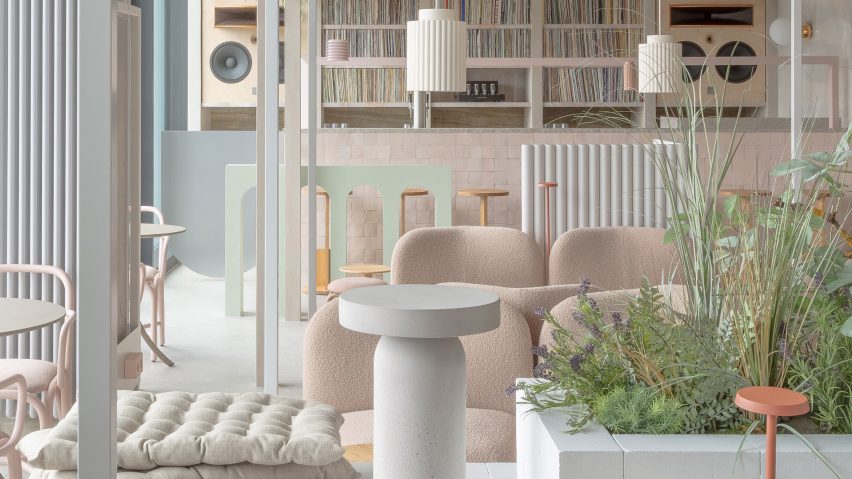Glass screen doors, bespoke furniture and natural textures draw on the waterside location of Locke at East Side Gallery hotel in Berlin by architecture studio Grzywinski+Pons.
Located in the inner-city Friedrichshain district, Locke at East Side Gallery contains 176 studio apartments equipped with kitchenettes and living areas, for short stay through to longer tenancies as part of the Locke group's "home-to-hotel" format.
For the interiors, Matt Grzywinski of Grzywinski+Pons told Dezeen he wanted "the look and feel to be expressive and aspirational, but also comfortable and even quietly nurturing".
"I wanted to see if it could be exciting and calming all at once," he said.
This dualism is reflected in the location of the hotel which, in one direction, faces the River Spree and overgrown riverfront lots on the opposite bank in Kreuzberg. The other side of the building, facing onto a busy road, looks out to the Mediaspree skyline of offices and hotels.
The interior design takes its cues from the building's microlocality. Bespoke kiln glass was made for glass panels in the rooms, which have the same character as the surface of the River Spree in grazing light. Most suites have private balconies with river or skyline views.
"The Spree is a pretty placid river, and the light reflecting off of its gently textured surface is a major component of the views from the hotel," Grzywinski told Dezeen.
Raw concrete walls echo the remains of the Berlin Wall, which are directly in front of the hotel on the Friedrichshain side.
"I try to employ texture to provide comfort and warmth in spaces or, conversely, contrast that with sleek or glossy surfaces," the designer said.
In the rooms, the palette of wood, concrete and textured glass was enlivened with pastel coloured soft furnishings, including turmeric chairs, pastel mirrors, braided grass rugs, suede and rattan headboards and screens.
"Colour for me is intuitive," Grzywinski explained. "Blush, mint, buff – powdery tones that I thought were a nice foil to the largely neutral and monochromatic, even industrial, context."
Grzywinski+Pons designed the majority of the furniture for the rooms, but also specified lighting and some other pieces including Jacques Biny bedside wall lights, which were integrated into custom bedheads, and BRDR Krueger chairs to complement the studio's dining tables.
The ground floor features complimentary co-working area for guests and locals, including a coffee shop and audiophile bar, as well as the Anima restaurant.
Intended as a dedicated space for music lovers, the eating, drinking, listening concept of Anima was informed by Japan's "kissaten" hi-fi cafes, which preceded affordable home stereos.
The restaurant said they hope to help guests "connect to music and one another in a warm setting".
The social spaces on the ground floor resemble a gallery space that is used for art exhibitions and community events.
Built-in seating and planters were fabricated from locally-sourced bricks comprised of recycled sand and lime. Furnishings echo the wider design treatment in a palette of timber, cane, fabric and cord.
"As furnishings and installations get closer to the touch level, I introduced colour and texture that hopefully was harmonious, and in contrast to the otherwise raw public spaces," Grzywinski said.
"The wall curtains literally transition from grey to blush with an ombre print," he continued.
"I wanted the hotel to capture some of that strange magic Berlin has, where you can feel like you are in the centre of a vast and dynamic avant-garde metropolis, which simultaneously presents like a tranquil retreat."
Since its first location opened in 2016, Locke has expanded to include 14 sites across the UK and mainland Europe, with Zurich, Copenhagen, Lisbon and Paris locations due to open in the next year.
Other hotels recently featured on Dezeen include The Hoxton Charlottenburg by AIME Studios in Berlin and Cowley Manor Experimental in the Cotswolds, UK, designed by Dorothée Meilichzon.
Photography is by Nicholas Worley.

